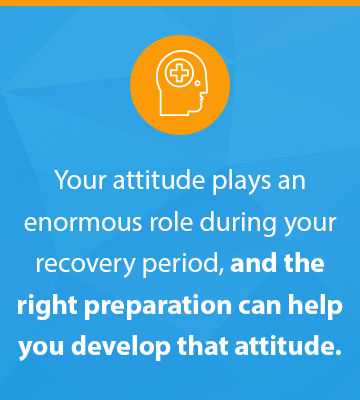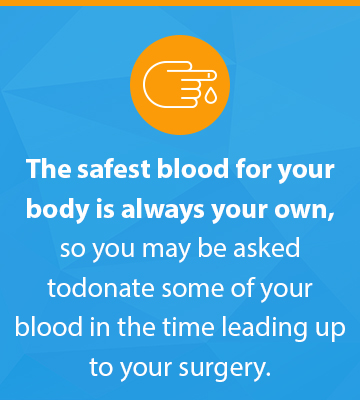If you’re dealing with frequent back or neck pain, your posture might be playing a bigger role than you think. Whether you're sitting at a desk all day or scrolling on your phone for hours,…
Are you facing an upcoming surgery? Is the idea of your surgery so intimidating that’s hard to think about anything else? That’s an understandable reaction.
Having surgery is a daunting prospect for anyone, so you aren’t alone in having some fears or concerns. Knowing about your surgery far in advance might make you nervous or cause you to dread the day.
Instead of filling the days or weeks leading up to your surgery with fear, why not use those weeks to prepare yourself for your recovery period? You can also spend that time getting ready for surgery — both physically and psychologically.
The idea of preparing your house for post-surgery life is a good one because you might need to make certain modifications in the home. But the psychological preparation is equally if not more important. Your attitude plays an enormous role during your recovery period, and the right preparation can help you develop that attitude.
Science backs this idea up. More than 200 research studies conducted over the past 30 years showed that patients who did some serious psychological preparation before their surgery experienced a whole range of benefits that set them far ahead of the patients who hadn’t done any preparation.
These benefits included:
- Less stress and anxiety both before and after the surgery.
- Fewer complications during the recovery period.
- Fewer healthcare demands during the recovery period.
- Less pain and less need for pain medication during the recovery period.
- Shorter hospital stays post-surgery.
- Increased satisfaction with procedure as a whole.
- Faster recovery time overall.
With the right preparation, you can be ready to face your surgery with confidence and determination. If you’ve asked yourself how you can be preparing for surgery, you’re already on the right track.
It’s important to realize that different surgical procedures mean different healing processes. Your doctor may ask you to avoid lifting anything, and avoid bending or taking stairs, or any number of things.
However, the opposite may also be true. Other kinds of surgeries require you to resume your regular daily activities after your surgery. In these cases, avoiding your regular activities could hinder your recovery. Make sure you discuss your case with your doctor so you have a good idea what your recovery period will look like.
To help you along your way, here are 15 ways you can start preparing for your surgery.
-
- Rearrange Things
Do you have any commonly used items that are currently in difficult-to-reach places? This might include Consider moving these things, like towels on high shelves or pots and pans in low cabinets — to more easily-accessible locations. After surgery, things like bending over or standing on stools to reach high shelves will become much more difficult and could potentially interfere with your body’s healing process. You’ll want everything you use on a regular basis to be close by and easy to reach.
- Rearrange Things
-
- Plan Your Meals
Another good idea is to prepare meals ahead of time. As you’re recovering from your surgery, making dinner is going to be a much more strenuous job. It might be worthwhile to make food ahead of time and freeze it, or otherwise store it. Consider buying frozen or prepared meals to last for a while. You might also use paper plates and cups and disposable silverware to save yourself the work of washing dishes or bending over to load and unload a dishwasher.
- Plan Your Meals
-
- Install a Toilet Riser
Bending might be difficult, and sitting and standing could be a challenge as well. Because of this, you may want to invest in a toilet riser. It’s a rounded piece of plastic that fits on top of your toilet seat and raises it about 8 inches higher, making your toilet a little easier to use during your recovery period.
- Install a Toilet Riser
-
- Invest in a Reacher
Moving and reaching is going to be painful and difficult for a little while. In the meantime, it’s going to be most convenient to have an easy way to grab things that are too far away to reach without moving.These tools are usually two or three feet long and have a pair of pincers at the end that can help extend your reach. You can buy one from a rehab center, order one online, or even check the stock at your local pharmacy or department store.
- Invest in a Reacher
-
- Buy New Shoes
Investing in some slip-on shoes is a must. Have you ever thought about how far you have to bend over to tie your shoes? Continuing to do so immediately after surgery might be detrimental to your recovery. Buying a pair of slip-on shoes will eliminate that problem.
- Buy New Shoes
-
- Make Arrangements With Family and Friends
Your physical capabilities are going to be severely limited after your surgery. This will make daily tasks like cleaning, taking out the trash and walking the dog difficult, if not impossible.In the days and weeks leading up to your surgery, make arrangements for these types of activities with your friends and family. If this isn’t an option for you, consider who else you might ask. Would a neighbor be willing to take out your trash and recycling? Perhaps you could consider hiring help in cleaning the house for several weeks.
- Make Arrangements With Family and Friends
-
- Stop Smoking
This is extremely important. Smoking is unhealthy and has especially harmful consequences for anyone planning to undergo surgery.The negative consequences are numerous. Smokers are a higher surgical risk because of problems with the lungs and heart. Smoking also constricts blood vessels, resulting in a decreased oxygen flow to the spine. For your bones to heal, they need all the oxygen they can get. Quitting smoking is one of the best ways to begin to fix this problem.For your body to begin to see the benefit of quitting, it’s a good idea to stop smoking at least three months before your surgery. The sooner you quit, the better off your body will be. If you have more time than three months, you’ll be even better off.
- Stop Smoking
-
- Exercise and Eat Well
For your recovery to be as smooth as possible, you’ll want to make sure that you’re in the best health you can be in before you have your surgery. But keep in mind that everyone’s best shape is different and is unique to them. Maybe you’re a champion yoga instructor, or maybe you just like to go for walks on your lunch break. Either way, being in good physical health means your body will have an easier time healing you after your surgery. It’s also important to remember to eat right. Your body will be able to heal you the best if it’s been receiving all the necessary vitamins and nutrients that it needs to keep things running smoothly. If your immune system is already unhealthy before the surgery, your recovery process is likely to be more difficult.It’s also a good idea to get regular, full nights of sleep and to drink plenty of water. All of these steps will help get your body into good health before your surgery.
- Exercise and Eat Well
-
- Lose Some Weight
Not everyone needs to lose weight. In fact, sometimes it’s important that you do not lose weight. However, if you’re carrying a significant amount of extra weight, it simply means that your body will have a more difficult time during the recovery process.This goes along with the idea of exercising and eating well and should be a natural consequence of those steps. It’s very important not to embark on any extreme diet right before surgery, as these will often cause the body to retain weight, and will do nothing more than drain the body of nutrients needed for the healing process.Talk to your doctor about this step and see if it would be a good idea for you.
- Lose Some Weight
-
- Stop Medication
After your surgery, your doctor might prescribe you specific medications. For these medications to work as well as they possibly can, you might need to be weaned off any other common medicines you may regularly take.It’s a good idea to have your system free of any painkillers such as Advil, Motrin, Ibuprofen and others. This helps the heavier painkillers your doctor will be prescribing to do the job they need to do. This doesn’t mean you should stop taking your prescription medication, such as blood pressure medication, especially if your doctor directs you otherwise.Always inform your doctors of all medication that you take, and follow their advice before starting or stopping any medication both before and after surgery.
- Stop Medication
-
- Donate Blood
Although this step isn’t necessary, it’s a good idea. The safest blood for your body is always your own. Because of this, many doctors and hospitals ask that you donate some of your blood in the time leading up to your surgery.Different doctors will have different procedures for this. Talk to your doctor and learn what your options and requirements are.
- Donate Blood
-
- Know Yourself
Of course, knowing yourself is great advice whether you’re getting surgery or not, but it’s of particular importance here. Everybody’s a little different, especially when it comes to handling stressful situations. You should be aware of yourself and how well you can handle different types of information.People tend to fall into two different categories — Monitors and Blunters — when they deal with potentially anxiety-inducing information. Monitors build confidence by arming themselves with knowledge. Blunters prefer to shield themselves from the details, as these will only cause stress and anxiety. Know which type you are, or if you fall somewhere in the middle, and plan accordingly.If you’re a monitor, you’ll feel better if you get busy researching and learn all you can about your upcoming procedure and all about the recovery process. Ask your doctor. Ask your friend whose cousin’s neighbor’s son just had the same procedure. Read discussion forums online. Knowledge is power and the more you have, the more confident you can feel.If you’re a monitor, you’ll feel better if you get busy researching and learn all you can about your upcoming procedure and all about the recovery process. Ask your doctor. Ask your friend whose cousin’s neighbor’s son just had the same procedure. Read discussion forums online. Knowledge is power and the more you have, the more confident you can feel.Everyone has their means of coping with stress. It’s important to figure out yours. Discover what helps you to be the calmest and collected you can be in your situation. The less stressed you are going into the surgery, the faster your body will be able to heal afterward.
- Know Yourself
-
- Pay Attention and Ask Questions
During the doctor’s appointments leading up to surgery, you’ll probably be asked to sign many consent forms and agreements. Most of these are written at a high level, and many people skim them and sign their names without really understanding what they’ve signing.Similarly, when your doctor talks, sometimes it feels like you understand half of what they’re saying, while the other half is medical jargon you aren’t familiar with. In one survey, only 42% of patients surveyed felt that they understood everything their doctor said to them, according to Spinehealth.com.The problem with this lack of effective communication is that if you don’t know what you’re signing, you might not understand what you’re getting into and you might be unhappy with the results. If you don’t know what your doctor is talking about, you might be confused about the direction things end up going.There are different ways to deal with this depending on if you’re a monitor or a blunter. If you’re a monitor, then you’ll speak up. Ask a question for clarity when you don’t understand. Take notes. Read those forms carefully, ask for copies of the signed versions and ask for explanations if something doesn’t make sense.If you’re a blunter, rely on that trusted friend or family member who comes with you. Ask them if they would be willing to ask questions for you and look over forms before you sign them and help you organize forms and paperwork you receive throughout.
Whether it’s you or a friend, it’s important that someone is aware of what to expect moving forward. This will help as you prepare for your surgery and make plans for your recovery period.
- Pay Attention and Ask Questions
-
- Be Involved
Healing from surgery is a stressful process, and it might be tempting to lie back and let your body do the work for you while your brain takes a vacation. But your attitude and your emotions have an enormous impact on your healing process. If you are confident and determined to get better in a hurry, the odds are good you will.Of course, that’s not an easy attitude to maintain. That’s why it’s important to mentally prepare yourself ahead of time. If you feel pre- or post-surgery doldrums beginning to get you down, you’re ready for these feelings. You’ve got a plan of attack ready to get yourself mentally and emotionally back on track.One great technique to help yourself out when you start to have negative thoughts is called “thought-stopping”. This process begins when you realize you’re having a negative or discouraging thought about your current situation that is unhelpful and untrue. Your job is to identify this thought and replace it with a new thought that is positive, true and helpful.This technique might not work for you, and that’s okay. Maybe simple relaxation exercises would be better. The key is to find techniques that work for you and help you feel more positively about your recovery.
- Be Involved
- Talk to Your Doctor
These preparations will vary based on your doctor and on the type of surgery you’ll be undergoing. Your doctor will go over specifics with you. If they don’t, do not be afraid or intimidated from asking questions.Typically, it’s best to stay away from any junk foods with no nutritional value before your surgery. It’s also wise to avoid any whole grains that take a long time to travel through the digestive tract. Limiting your dairy intake is also a good idea.You only need to bring what toiletries you want with you to the hospital. Any valuables should be left at home, or with a family member who’s accompanying you.
The most important thing now is not to stress. You’ve done your preparation and it’s to take a deep breath and relax.
By following these 15 tips, you can get your house in order for your surgery and also get your body healthy for the task ahead. Most importantly, you can prepare yourself psychologically for the mental and emotional work ahead. Your body is going to be doing the incredible work of healing itself after surgery. The best thing you can do is prepare your brain to help your body out.





